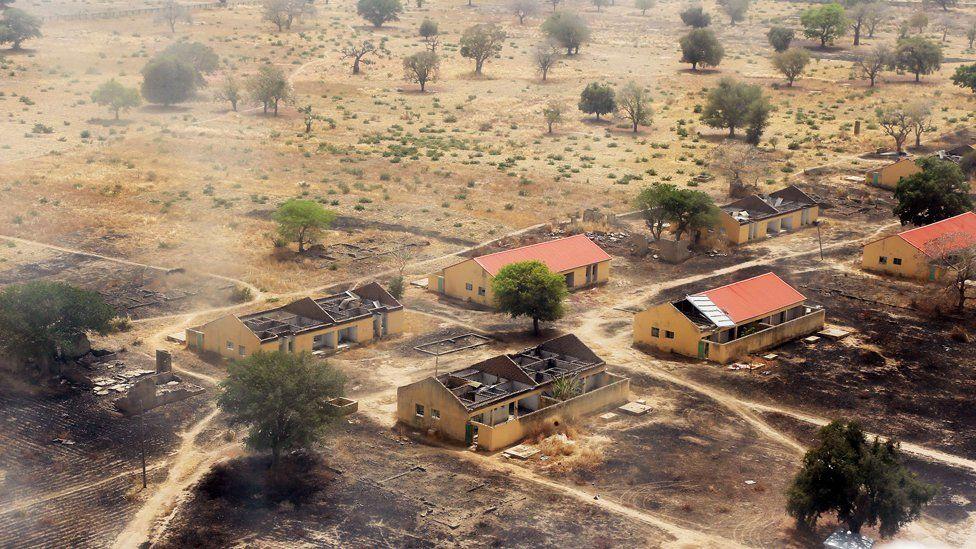Ten years afta Boko Haram gunmen kidnap im daughter from her school for di Nigerian town of Chibok, Yama Bullum feel as if im don lose her once again.
Im daughter, Jinkai Yama, na one of di 276 girls di Islamist fighters kidnap from di secondary school for di early hours of 14 April 2014.
Fifty-seven of dem escape. Then between 2016 and 2018, additional 108 of dem dey rescued by di military or released through negotiation.
Ninety-one odas still dey miss, but Ms Yama na one of di 20 “Chibok girls” wey dey rescued ova di last two years from Boko Haram hideouts for Sambisa Forest for north-eastern Borno State, di epicentre of di 15-year insurgency.
But her father dey para as e discover say like some of di oda recently freed women, she don decide to remain married to one of di fighters wey once hold her captive.
Dis couples now dey live for di city of Maiduguri – Borno capital, 125km (78 miles) north of di remote town of Chibok – for one housing estate wey di state govnor Babagana Umaru Zulum arrange.
“I no happy wit wetin di govnor do. Di girls manage to come out of di forest and di govnor marry dem off again. Her mother dey vex seriously,” Oga Bullum tok.
E find out wen im daughter call am up to tell am last August – and she tell am to tok to her husband for fone, di former insurgent.
Until den, Oga Bullum reason say she dey wit di oda freed Chibok captives and her three children for one special welfare programme.
Like a number of oda Chibok parents, Oga Bullum dey disturbed by wetin be like Nigerian goment approval of marriages between dia rescued daughters and di men wey abduct dem.
E say to allow di freed women to live wit dia former captors and for goment to provide dem wit accommodation, parents dey see am as if Govnor Zulum sacrifice dia daughters sake of dia mission to stabilise di region.
Dem see dis marriages as way to appease di former militants.
Most of di girls dem take from Chibok school na Christian.
Di recent news of di continued “marriages” don further upset parents wey dia children dey forced to convert to Islam during captivity.
“Some pipo for Chibok dey say: ‘How e dey possible afta dem rescue di girls, dem still remain for di Muslim faith?'” Yakubu Nkeki, chairman of di Chibok parents’ association tok.
Di state appear to dey grapple wit di dilemma of respecting di girls wishes while dem dey fulfil di desires of dia parents.
“Even bifor dem come out [of Sambisa Forest], some of dem give us conditions – say dem no go come witout dia husbands,” Govnor Zulum tok.
One of dis women, Aisha Graema, tell me say she for no comot di forest if she no go fit be wit di militant she marry two years afta dem kidnap her from di Chibok school.
“We don marry for eight years,” di mother of three tok.
“I first come out of di forest and den e follow me. Dia in di bush, we no get relative, no brother, no sister, dat na why we decide to come out.
“E finish deradicalisation bifor dem allow us stay togeda. Di goment welcome us well, give us food, shelter, evritin.”

Anoda Chibok girl, Mary Dauda, explain to me say she for no fit escape from Sambisa witout her husband, who help her sneak away from di militants hideout.
“We bin agreed say e go join me afterwards and present imsef to di govnor for rehabilitation,” di 27-year-old tok.
Hajj Camp for Bulumkutu na di main rehabilitation camp for former Boko Haram fighters and dia long-term captives, na dia dem dey carry dem go afta dia rescue.
Afta dem go through weeks of rehabilitation for dia, dem go come reintegrate di men into di society under di goment ongoing amnesty programme for repentant Boko Haram members.
Dis so far don process about 160,000 pipo, according to Oga Zulum.
Di welfare of di 20 most recently freed Chibok girls fall under di remit of Zuwaira Gambo, di Borno State commissioner for women affairs and social development, wey insist say dem no force di women to stay wit dia husbands.
“Na dem insist say witout dia husbands, dem no go stay for Maiduguri,” Ms Gambo tok.
“I ask dem: ‘How you go wan stay wit dis man wey spoil your life?’ and dem tell me: ‘You no go understand.'”
Instead make di couples return to di forest, she say di authorities find different path.
Dem move di 20 women – plus dia 31 children go one secure facility for one comfortable area for Maiduguri. Seven dey wit dia Boko Haram husbands; some odas dey engaged to former fighters dem meet wen dem dey Bulumkutu.
Goment dey train di women for skills like tailoring and computer literacy.
Dem dey share one large mansion, wey get big compound wia dem fit put mats gada under tree to chat as dia children dey use sand play.
Each couple get dia own room.
No be only di freed Chibok girls wan stay wit dia Boko Haram husbands.
One 16-year-old tell me for 2016 say, if to say she get gun, she for shoot di sojas wey come rescue her from captivity.
Experts attribute dis to several factors, wey include di sense of belonging wey dem get as dem mix wit di insurgents, indoctrination into dia extremist beliefs, di development of romantic attachments ova time plus di formation of family bonds, particularly wen dem get children togeda.
Additionally, acts of kindness and care, like how dia captors dey shower dem wit gifts fit contribute to dis feelings.
“Dis pipo take di time to convince dem say wetin dem know bifor na di wrong way,” Fatima Akilu, one psychologist wey work wit many freed captives dem take for dia formative years tok.
But di situation of di Chibok girls stand out becos of di goment active support for dem and dia husbands to stay togeda.
Governor Zulum believe say dis go encourage dose wey still dey Sambisa to come out of hiding.
Di chairmo of di Association of Parents of di Missing Girls from Chibok say e find imsef torn between di grievances of di parents and di rights of di young women.
“Di girls tell me say dem no fit do witout dia husbands,” Oga Nkeki tell me.

“Me, myself, I be freedom fighter and I wan make dem dey free from Sambisa Forest regardless of di situation dem find demselves wen dem come out, weda Muslim or married or not.”
E tok how dem urgently call am to di childhood home of Saratu Dauda, one of di recently rescued Chibok girls last year during one heated argument between her and her parents on top her decision to remain married to her former captor.
“Dem say: ‘Come hear wetin dis girl dey tok. You dey say make dem release dem, yet see how dem dey behave. I tell dem no be her fault, dem gatz dey patient.”
Aisha Muhammed-Oyebode from di Bring Back Our Girls activist group and head of di Murtala Muhammed Foundation, wey support both di parents and di freed girls, believe say dem for fit avoid issues like dis if to say goment bin get beta plans for di girls afta dia release.
“Na becos structure no dey around dis kind of situations, dat na wetin dey cause dia kind wahala,” she tok.
Afta di explosive family argument, Ms Dauda cut short her visit to Chibok and go back Maiduguri. Her father dey para so tey e don choose not to participate for di parents association or any events wey dey commemorate di anniversary of di abductions dis year.
Dis include di yearly gathering of parents of all di kidnapped schoolgirls, both free and missing, wey dey hold for di school premises.
Ms Yama no also dey follow her family tok. Whenever dem try to contact her, na her husband dey ansa her phone instead.
Di 29-year-old no gree respond to my questions about di situation, she tell me say her relationship wit her parents no be anybodi business and how she happy say her kidnapping lead her to findi d “true religion”.





